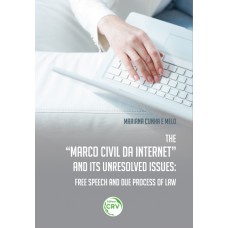This book is the outcome of a research conducted in the Master of Laws (LL.M.) program at New York University in the academic year of 2014/2015. This research focused on Internet and Constitutional Law doctrine in Brazil and the United States. Primarily, its goal was to present solutions to three issues poorly debated in Brazilian legal studies through a comparative analysis with the United States law. All three of the topics discussed in this book were ignored by the Marco Civil da Internet regulation in Brazil. In the wake of Brazilian Internet law systematization, it is important to move forward from what the Marco Civil has in fact accomplished and focus on the issues that were left behind. In this spirit, this research addresses, in its first part, the Constitutional prohibition of anonymity in Brazil. This provision is prescribed in the same article that guarantees freedom of expression. Quite incongruently, the Brazilian Constitution also protects data and communications secrecy, and reporter’s privilege. There is, therefore, an important question as to whether – and to what extension – the Brazilian Constitution in fact bans online anonymity. In the second part of the book, the discussion focuses on the restrictions copyright law imposes on free speech online. In this part, the analysis is limited to a critical view of the United States legislation. The objections to the current American law and the propositions formulated by the end of the topic, however, are also useful when analyzing the issue under the Brazilian law. For that reason, they should also be considered in an eventual Brazilian regulation of the issue. Finally, the third part of this book tackles issues related to transnational due process of law. The last topic proposes solutions to overcome geographic obstacles that still impair online business across the globe. The Marco Civil da Internet was passed into law amid great cheers of victory from Internet rights advocates. Even though the best interpretation and application of the Marco Civil are matters still open for debate, it is time for Internet law doctrine in Brazil to move forward and address some issues the Marco Civil left behind. The main goal of this research was to contribute to three topics the Brazilian Internet law should focus on next. They are: online anonymity, intermediary liability for copyright infringements, and transnational due process of law. Este livro é resultado de pesquisa conduzida na Universidade de Nova York no ano acadêmico de 2014/2015. O estudo se volta a questões não resolvidas pelo Marco Civil da Internet, sob uma análise comparativa do direito brasileiro e norte-americano. Todos os três temas se relacionam à defesa da liberdade de expressão e do devido processo legal nas relações jurídicas online.
| Código: |
25710 |
| EAN: |
9788544409503 |
| Peso (kg): |
0,330 |
| Altura (cm): |
23,00 |
| Largura (cm): |
16,00 |
| Espessura (cm): |
1,10 |
| Especificação |
| Autor |
Mariana Cunha e Melo |
| Editora |
EDITORA CRV |
| Número Edição |
1 |

